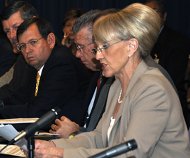1/16/2010
Arizona Governor Proposes Ballot Measure to Save Speed CamerasArizona governor believes photo enforcement could be saved by a ballot maneuver.

In a surprise move, Arizona Governor Jan Brewer (R) took a step to save the freeway speed camera program imposed by her predecessor, Janet Napolitano (D), the current US Secretary of Homeland Security. On Friday, Brewer proposed a Fiscal Year 2011 budget that cut spending by $1.1 billion, reduced the state's workforce by ten percent and raised taxes by $1 billion to address massive deficits brought on by overspending during the economic downturn. Also tucked into the budget were assumptions that automated ticketing would continue beyond 2011, based on expected results from a new referendum proposal.
"The executive proposes referring the continuation of photo enforcement to the voters in November 2010," Brewer's budget stated.
The contract to operate the freeway speed cameras expires in July, something Brewer has suggested she might allow to happen. This would be a minor defeat for Redflex Traffic Systems, the Australian company that runs the cameras, but it would not be a fatal blow. Because the public has refused to pay the $181 tickets, Redflex has actually lost money on the program. What the company most fears is the initiative being circulated by the group CameraFraud.com to place a ban on all forms of photo enforcement before voters this November. Were Brewer simply to refuse to renew the contract, there would be no reason to hold a referendum on a freeway program that would no longer exist.
Brewer would not expect cameras to win a freeway camera ballot measure. The photo ticketing industry understands that no photo enforcement measure has ever survived when put on the ballot. The only such vote to take place in Arizona resulted in two-thirds of voters rejecting speed cameras. Instead, the competing ballot measure would cause confusion and drain support from the proposed CameraFraud ban on the highly lucrative municipal red light cameras and speed cameras. This is what Redflex and its competitor, American Traffic Solutions, truly fear. Brewer's openness to the plan likely stems from her close ties to Jay Heiler, the top lobbyist for Redflex. When she took office in 2008, Brewer's first move was to turn to Heiler for advice on staffing her administration.
According to budget documents, the freeway photo radar program has generated $17,297,900 for Redflex, as well as $6,427,000 for the state supreme court and the judiciary. A total of $10,516,800 has gone to the state's general fund. The state Department of Public Safety (DPS) took $2,173,000. Legislators added $1,471,700 to their personal campaign fund accounts.
For fiscal 2011, Brewer's budget predicts that freeway cameras will issue 384,864 tickets worth $69,852,816, but because most motorists have simply refused to acknowledge these citations -- the current payment rate is just 26.8 percent -- a mere $18,720,636 in revenue will be generated.
Brewer did accede to one of the demands of photo enforcement opponents. On Wednesday she deposed Napolitano's personal choice for state police chief, Roger Vanderpool. Vanderpool has been the primary spokesman for photo enforcement, using Department of Public Safety resources to conduct staged events to promote the continued use of automated ticketing machines. In Vanderpool's place, Brewer named Robert Halliday, a 35-year DPS veteran who focused on criminal investigations and counter-terrorism.


